 |
|
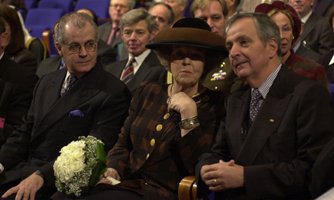 Highlights from Monday, 13 November: Highlights from Monday, 13 November:
Opening Ceremony
The Sixth Conference of the Parties
(COP-6) to the United Nations Framework Convention on Climate Change
(UNFCCC) and the resumed thirteenth sessions of the UNFCCC's subsidiary
bodies opened on Monday, 13 November, in The Hague, the Netherlands.
Delegates met in the morning for a welcoming ceremony. This was
followed by the opening COP-6 Plenary, during which Jan Pronk, Dutch
Minister of Housing, Spatial Planning and the Environment, was elected
COP-6 President. Participants then considered organizational matters,
adopted the meeting's agenda, and heard general statements by delegates.
The thirteenth sessions of the UNFCCC subsidiary bodies resumed
late afternoon in a joint session to consider adverse effects, the
Protocol mechanisms, a compliance regime, and capacity building.
The Subsidiary Body for Scientific and Technological Advice (SBSTA)
convened in the evening to consider several agenda items, including
land use, land-use change and forestry (LULUCF), guidelines under
Protocol Articles 5 (methodological issues), 7 (communication of
information) and 8 (review of information), and policies and measures.
The Subsidiary Body for Implementation (SBI) addressed organizational
matters, national communications, the financial mechanism, and administrative
and financial matters. In addition, contact groups met to discuss
the mechanisms and technology transfer. Above photo (L-R): UNFCCC
Executive Secretary Michael Zammit Cutajar, Queen Beatrix of the
Netherlands, and UNEP Executive Director Klaus Töpfer
 Extended
Photo Coverage of COP-6 Extended
Photo Coverage of COP-6
|
|
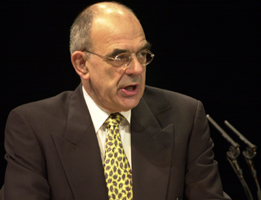
COP-6 President-designate Jan Pronk
welcomed participants. Noting the "unmatched success" achieved by
negotiators at Kyoto in reaching agreement on quantified emissions
targets, he said COP-6 participants face the greater challenge of
agreeing on the instruments and details to achieve these targets.
He noted that developing countries are the least culpable for problems
resulting from climate change and have the least economic resilience,
yet will suffer the most devastating consequences. While acknowledging
the significant differences between countries' positions on key
issues, he said that reasonable compromises are possible on all
issues, and urged delegates to take principled, balanced and credible
decisions.
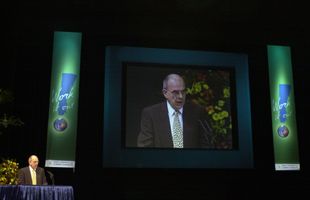  RealAudio of Pronk's welcoming statements: part
one part
two
RealAudio of Pronk's welcoming statements: part
one part
two
|
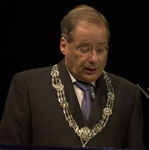
|
Wim Deetman,
Mayor of The Hague, expressed the hope that this would become the
city where history will be made in the development of climate change
management. He particularly welcomed young participants and said
it was important that their voices are heard.
 Real
Audio of Wim Deetman's welcoming statement
Real
Audio of Wim Deetman's welcoming statement
|
|
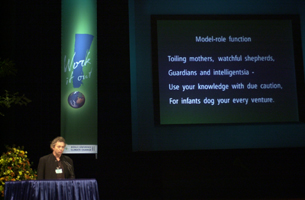 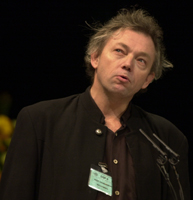
Dutch
actor Aus Greidanus of short quatrains on climate change
written by Dutch national poet Gerrit Komrij.
|
|
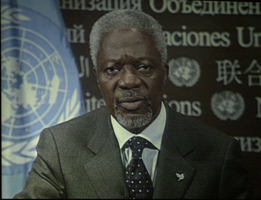 In
a pre-recorded video message to delegates, United Nations Secretary
General Kofi Annan stated that the task of reducing greenhouse
gas emissions was enormous, and would require "radical change."
He said success would require a credible rulebook on climate change,
a new path and commitment to development, and a convincing signal
to the business community that reducing greenhouse gases is in their
best interests. He drew attention to support at the recent United
Nations Millennium Summit for every effort to be made to bring the
Kyoto Protocol into force by 2002. In
a pre-recorded video message to delegates, United Nations Secretary
General Kofi Annan stated that the task of reducing greenhouse
gas emissions was enormous, and would require "radical change."
He said success would require a credible rulebook on climate change,
a new path and commitment to development, and a convincing signal
to the business community that reducing greenhouse gases is in their
best interests. He drew attention to support at the recent United
Nations Millennium Summit for every effort to be made to bring the
Kyoto Protocol into force by 2002.
 RealAudio
message of Kofi Annan
RealAudio
message of Kofi Annan
|
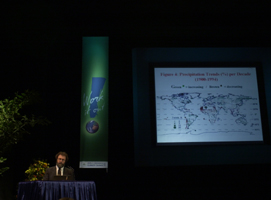 Robert Watson,
Chair of the Intergovernmental Panel on Climate Change (IPCC),
described the current state of scientific understanding of the
Earth's climate system, highlighted the vulnerability of ecological
systems, and underlined the need for effective policy and technological
responses. Noting that the last two decades have been the warmest
in 1000 years, he said the question is no longer whether the climate
is changing in response to human activities, but rather how much,
how fast, and where. He noted a projected increase in global mean
surface temperatures of about 1.5oC - 6oC by 2100 (almost double
the previous IPCC predictions), an increase in sea levels, and
increases in the frequency and magnitude of the El Nino effect,
and outlined the negative implications of these increases for
water resources, agriculture, natural ecosystems and human health.
Robert Watson,
Chair of the Intergovernmental Panel on Climate Change (IPCC),
described the current state of scientific understanding of the
Earth's climate system, highlighted the vulnerability of ecological
systems, and underlined the need for effective policy and technological
responses. Noting that the last two decades have been the warmest
in 1000 years, he said the question is no longer whether the climate
is changing in response to human activities, but rather how much,
how fast, and where. He noted a projected increase in global mean
surface temperatures of about 1.5oC - 6oC by 2100 (almost double
the previous IPCC predictions), an increase in sea levels, and
increases in the frequency and magnitude of the El Nino effect,
and outlined the negative implications of these increases for
water resources, agriculture, natural ecosystems and human health.
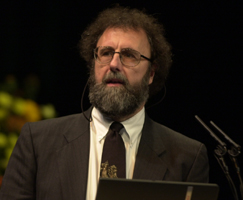  RealAudio of Robert Watson's presentation:
RealAudio of Robert Watson's presentation:
Part
1 Part
2
|
|
Plenary: Opening Session of COP
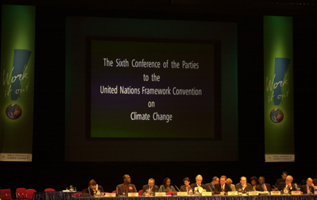
The dias during the official opening
of the COP
|
|
Jan Szyszko, President of COP-5, opened COP-6,
stating that it was possible to reach agreement and ensure that
the Protocol entered into effect before the end of 2002, but that
many difficult issues had still to be resolved. He expressed his
gratitude to those who had provided assistance during his presidency.
 Real
Audio of Jan Szyszko's opening statement
Real
Audio of Jan Szyszko's opening statement
|
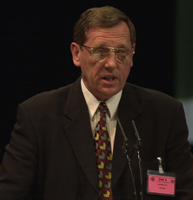 |
|
|
Jan Pronk,
Minister of Housing, Spatial Planning and Environment of the Netherlands,
was elected President of COP 6.
|
|
|
UNFCCC Executive Secretary
Michael Zammit Cutajar drew attention to the evidence presented
by Robert Watson, and underscored that action to deal with climate
change cannot be delayed. He said developing countries should feel
supported in their efforts to address climate change and its impacts,
and all Parties should consider the Protocol to be ratifiable. He
said substantive results should be reached during the first week
of COP-6 so political agreements could be sealed by mid-next week,
allowing technical drafting to take place before close of the meeting.
 Real
Audio of Michael Zammit Cutajar's opening statement
Real
Audio of Michael Zammit Cutajar's opening statement
|
|
NIGERIA, on behalf
of the G-77/CHINA, said COP-6 discussions should be based on equity
and justice. Noting that many Annex I Parties had not fulfilled
their UNFCCC commitments on reducing emissions or on technology
transfer and financial assistance, he said his group rejected the
proposal by a "key Annex I country" tying the provision of financial
assistance for developing countries to some form of new emissions
reduction commitment by these countries. He urged provision of funding
through a mechanism other than the GEF.
|
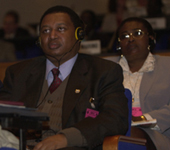
|
|
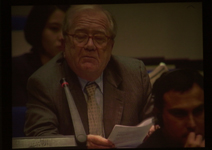
|
FRANCE,
on behalf of the EU, stressed that domestic actions should be the
main means for fulfilling developed country commitments. |
|